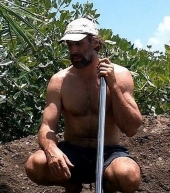
 5
5




Sarah K. aka. "Yurtiful Momma"
Family, Life, Permaculture homesteading, and living off-grid in a tiny home, Mongolian yurt. Check us out at www.ouryurtifullife.com!
 3
3




It's never too late to start! I retired to homestead on the slopes of Mauna Loa, an active volcano. I relate snippets of my endeavor on my blog : www.kaufarmer.blogspot.com
 2
2




 2
2




"The only thing...more expensive than education is ignorance."~Ben Franklin. "We can easily forgive a child who is afraid of the dark; the real tragedy of life is when men are afraid of the light." ~ Plato
 2
2




 We are definitely looking into raising mealworms and having a maggot bucket to help feed the chickens through the winter. As for the goats, I thing bartering may definitely be the way we need to go at first.
We are definitely looking into raising mealworms and having a maggot bucket to help feed the chickens through the winter. As for the goats, I thing bartering may definitely be the way we need to go at first.
Sarah K. aka. "Yurtiful Momma"
Family, Life, Permaculture homesteading, and living off-grid in a tiny home, Mongolian yurt. Check us out at www.ouryurtifullife.com!
 2
2




 2
2




 2
2




 Some are "mean" but those I have seen are usually just trying to protect their mate, babies, territory, etc. We had one goose who would go after anything he thought was going to take away his girl... but that was probably because his former owners knew little about geese (only kept them because they looked cool on their manicured estate) and separated him from his mate for months while she was setting and hatching babies, but kept him where he could still hear but not see her (torture in my mind). After we got them, we immediately put them back together and he was very protective of her, but it was mostly just hissing a back off warning.
Some are "mean" but those I have seen are usually just trying to protect their mate, babies, territory, etc. We had one goose who would go after anything he thought was going to take away his girl... but that was probably because his former owners knew little about geese (only kept them because they looked cool on their manicured estate) and separated him from his mate for months while she was setting and hatching babies, but kept him where he could still hear but not see her (torture in my mind). After we got them, we immediately put them back together and he was very protective of her, but it was mostly just hissing a back off warning.
Sarah K. aka. "Yurtiful Momma"
Family, Life, Permaculture homesteading, and living off-grid in a tiny home, Mongolian yurt. Check us out at www.ouryurtifullife.com!





List of Bryant RedHawk's Epic Soil Series Threads We love visitors, that's why we live in a secluded cabin deep in the woods. "Buzzard's Roost (Asnikiye Heca) Farm." Promoting permaculture to save our planet.
 4
4




What do you suggest for someone starting out who wants to be off the grid and completely self sustainable?
 1
1





|
Hey, sticks and stones baby. And maybe a wee mention of my stuff:
Rocket Mass Heater Resources Wiki
https://permies.com/w/rmh-resources
|





